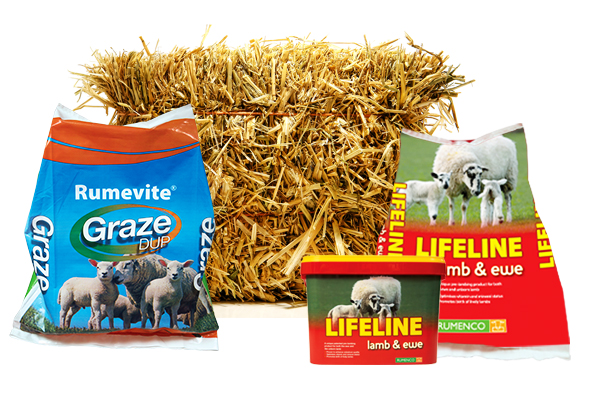Improving Lambing Returns Through Nutrition
With only 20% of breeding flocks proving profitable according to AHDB data then producers must analyse where they can adapt and change to ensure their systems remain sustainable for the long-term. Here, Dr Alison Bond, Commercial Nutritionist discusses the findings and how producers can utilise the information to drive profitability on farm as lambing approaches.
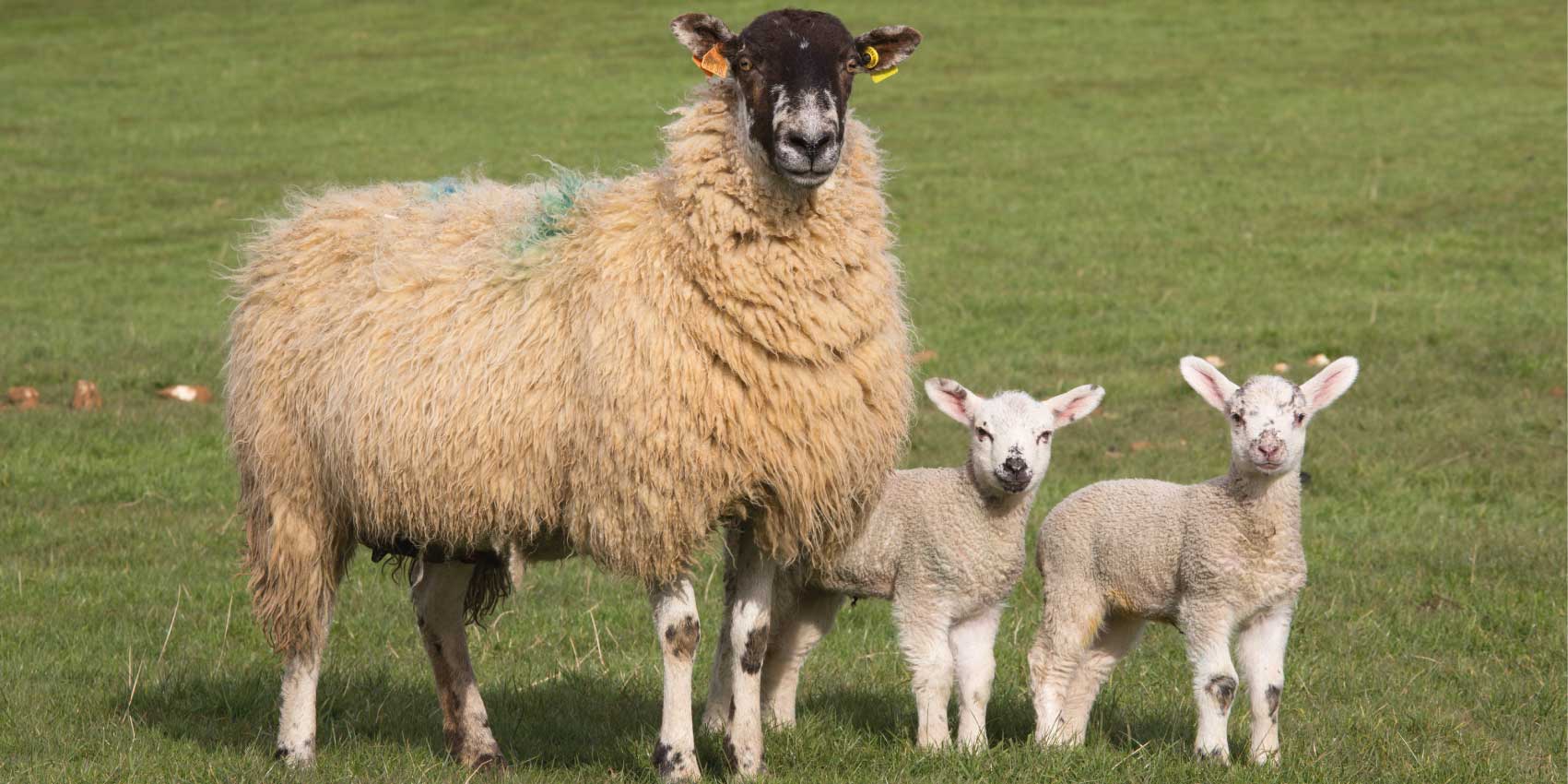
The top performing flocks in the UK can be characterised by the achieving three common factors which should therefore form the focus for profitability within all UK flocks:
- Strong control over costs
Less purchased feed and lower veterinary and medicine costs
- High physical performance
Fewer lamb losses within the first 48 hours and higher lamb weights at weaning
- Maximising returns from lambs sold
Higher returns for lambs sold as stores or finished
KNOW YOUR FORAGE AND CONTROL COSTS
In order to control purchased feed costs at lambing then producers need to know the nutritional value of their forages as this will drive feed use decisions (table 1). Understanding the value of forage helps minimise purchased feed costs as well as supporting a healthier rumen with correct, balanced supplementation.
Table 1: Percentage energy contribution of different forage types for a 70kg twin-bearing ewe at lambing time
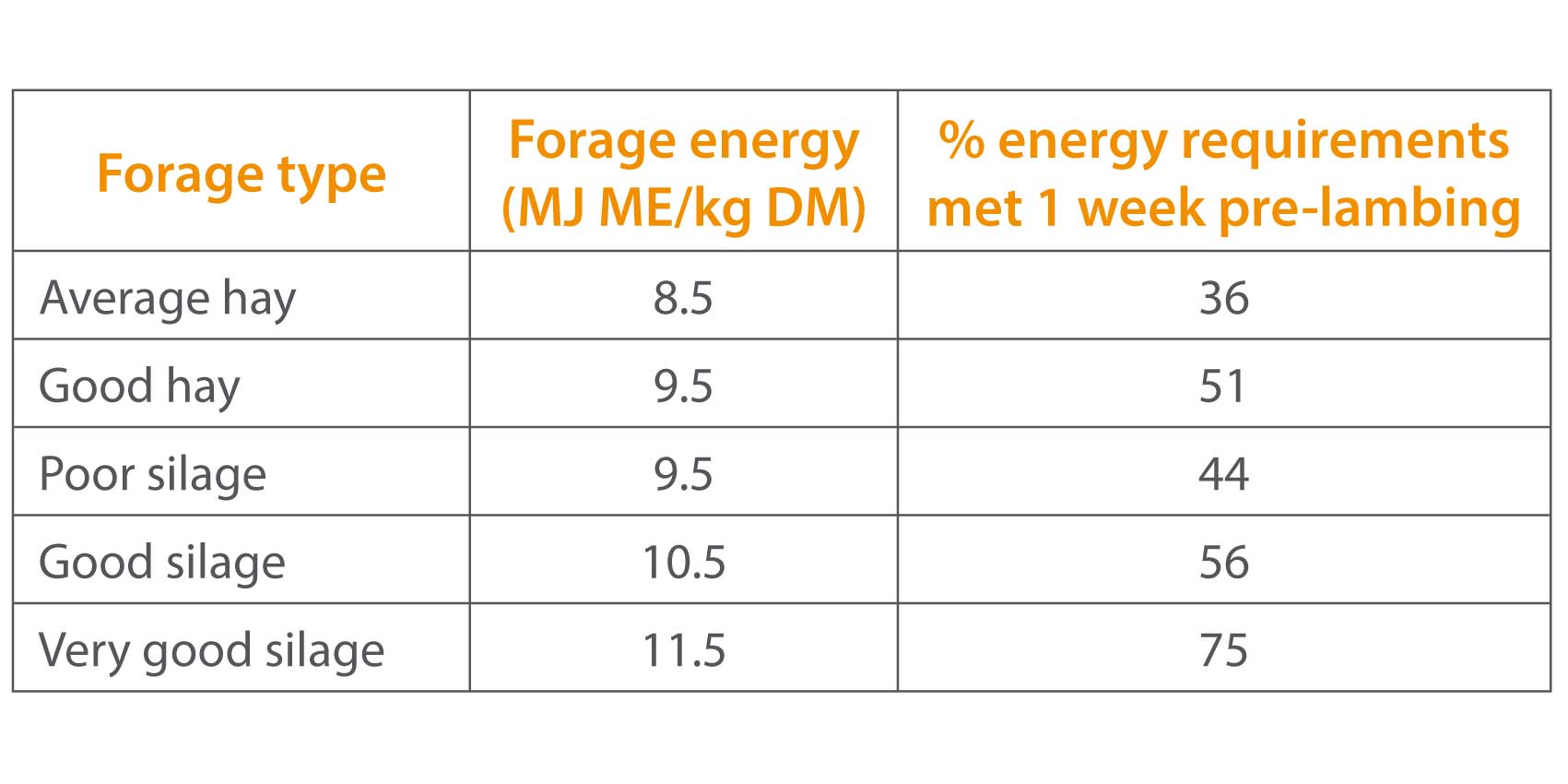
Where poorer quality forages are fed in the run up to lambing, higher levels of supplementary concentrates will be required so adding cost. Feeding higher levels of concentrates to balance poor quality forage puts ewes at higher risk of acidosis and itself reduces feed intake and forage digestion. Secondarily, more dominant animals within the flock face increased risk of becoming overfat through gorging trough fed concentrates, leading to higher incidences of twin lamb disease, prolapse, difficult lambings, and the production of over-sized lambs with reduced lamb vigour.
In comparison, where very good quality silage is available (11MJ+ of ME/kg DM), just 100g of soyabean meal per lamb carried plus supplementary minerals and vitamins may be necessary. This offers significant cost savings of up to £12 per ewe, and the supply of rumen by-pass protein supports the production of good quality colostrum and a plentiful supply of milk especially in poorer conditioned ewes and those compromised by parasites.
HIGHER PHYSICAL PERFORMANCE THROUGH QUALITY COLOSTRUM
Colostrum forms the cornerstone of lamb performance in the early days and weeks of life (and beyond). Ensuring lambs receive the recommended amount of good quality colostrum in the first 12 hours following birth has a direct impact on lamb survival and longer-term helps produce stronger, faster-growing lambs with higher feed intakes and the potential to be sold sooner. Data from The Animal Plant and Health Agency shown below (figure 1) shows the main cause of mortality in lambs up to 7 days of age to be lack of antibodies from colostrum (hypogammaglobulinaemia) showing how colostrum quantity and quality underpins lamb performance.
Figure 1: Main causes of lamb losses in lambs up to 7 days of age (source: APHA)
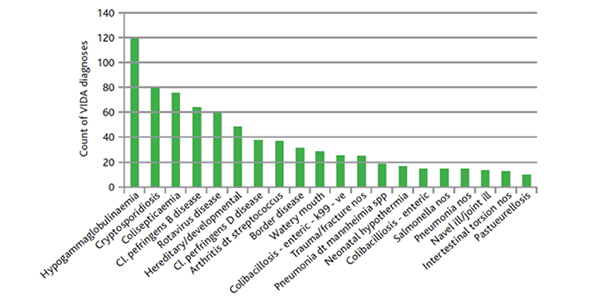
WHICH FORAGE SUPPLEMENT SHOULD I USE PRE-LAMBING?
No matter the forage type being offered in the run up to lambing, Rumenco’s LIFELINE Lamb & Ewe product range is specifically formulated for feeding during the final 6 weeks of pregnancy. All products help support colostrum quality, an easier lambing and improved lamb vigour, helping to form an integrated approach for a profitable lambing season. Available as a feed block, bucket or protein meal, it is suitable for all types of feeding systems.
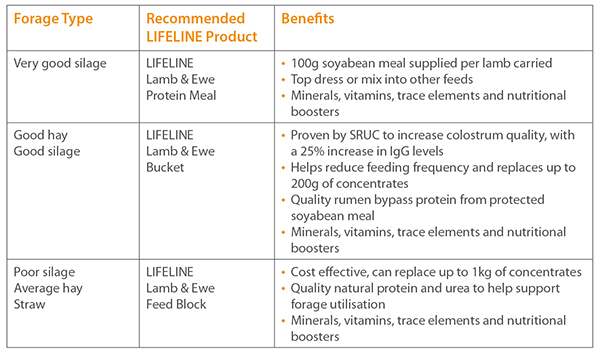
MAXIMISING RETURNS FROM EFFICIENT LAMB GROWTH
Maximising profitability doesn’t end at lambing with the birth of a viable lamb(s). It is estimated that for every 1kg of milk solids (5kg ewe milk) a lamb consumes, it will gain 1kg of liveweight during the earliest stages of life. But by weaning, it can take an extra 6kg of feed to gain that same kilo of weight, costing an extra £3 in concentrates for a set of twin lambs.
Rumenco’s Rumevite Graze DUP feed block has been developed to help support ewe milk production after lambing and subsequent lamb growth rates. The inclusion of a high level of digestible undegradable protein (DUP) from rumen-protected soya, makes it the ideal complement to spring grass which contains predominantly rumen-degradable protein so allows the modern-day ewe to realise her full milk potential. In addition, the blocks can completely replace trough feeding when sufficient fresh grass is available helping to minimise the stresses of mis-mothering, whilst also providing supplementary magnesium where spring grass staggers is a risk.
RESEARCH PROVEN TO INCREASE LAMB WEANING WEIGHTS
Independent studies carried out over two lambing seasons in association with SRUC have shown the benefits of offering Rumevite Graze DUP blocks after lambing. When fed as a follow-on supplement to LIFELINE Lamb & Ewe, the combined effect of both products resulted in twin bearing ewes producing 8.4kg more lamb weight at weaning (each lamb was 4.2kg heavier at 12 weeks of age) compared to those receiving no supplementation (table 2). Based on 2018 lamb prices, this would have resulted in an additional £23 per ewe from lambs sold, leaving a £16.50 margin over purchased feed.
Table 2: The effect of feeding LIFELINE Lamb & Ewe buckets and Rumevite Graze DUP blocks on lamb 12-week weight

“Since feeding Rumevite Graze DUP blocks after lambing, the flock remains calm when I drive into the field which makes it a lot easier to count the ewes and their lambs. It has also reduced my workload and is much simpler than compound feeding. I also record lamb 8-week weights, and scan for fat and muscle depth at 21 weeks. So far I am very happy with their performance”. – Edward Collins, award-winning Pedigree Lleyn and Blue Texel breeder.
